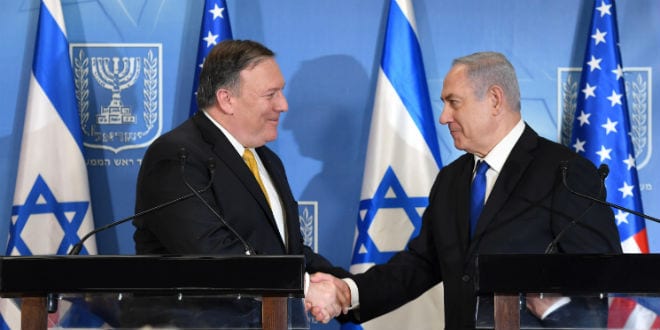When speaking to a Senate committee on Tuesday, Secretary of State Mike Pompeo refused to answer whether the U.S. still supports an independent Palestinian State.
When addressing the Senate Appropriations subcommittee to discuss the Trump administration’s 2020 budget request for the State Department and the primary United States aid agency, Pompeo was asked by Senator Chris Van Hollen (D-Md) as to whether the United States’ policy was still to support an independent Palestinian State created inside Israel.
“We are in the process of laying down our vision,” Pompeo replied.“Ultimately the Israelis and Palestinians will decide how to resolve this.”
Van Hollen persisted, demanding a direct answer.
“I think I’ve answered the question as I’m going to answer the question,” Pompeo said.
Pompeo was questioned about whether a Palestinian State would be included in the much-anticipated Middle East Peace plan being prepared by a special White House team.
“We’re hopeful that we have some ideas that are different, unique, which will allow the Israelis and the Palestinian people to come to a resolution of the conflict,” Pompeo said.
In light of the results of the Israeli elections on Tuesday, the question has serious practical implications. Several of the right-wing parties established annexing Judea and Samaria as part of their platforms. Prime Minister Netanyahu will need the support of these parties to form a coalition and it is likely he will commit to this policy as a condition for receiving their support. Netanyahu has taken sovereignty for some or all of these areas as a rallying cry in recent weeks perhaps in anticipation of this as a necessity for becoming prime minister.
Approximately 400,000 Jews live in Judea and Samaria and an additional 215,000 live in the eastern sections of Jerusalem. When Israel ceded Gush Katif to the Palestinian Authority, over 10,000 Jews were expelled in an act of ethnic cleansing. The people of Gaza then supported Hamas in its takeover of the region. It is unclear whether the creation of a Palestinian State inside of Israel would require expelling some or all of the Jews and what assurances can be made that the regions will not be used as a base from which to terrorize Israel.
As part of his campaign platform, Trump promised to move the U.S. Embassy from Tel Aviv to Jerusalem, a promise he fulfilled. Two weeks ago, the president dramatically announced that the U.S. would officially recognize Israeli sovereignty over the Golan Heights, making him the first world leader to do so. These moves, as well as the close relationship between the Israeli prime minister and the U.S. president, undoubtedly contributed to Netanyahu’s resounding victory.
Source: Israel in the News

